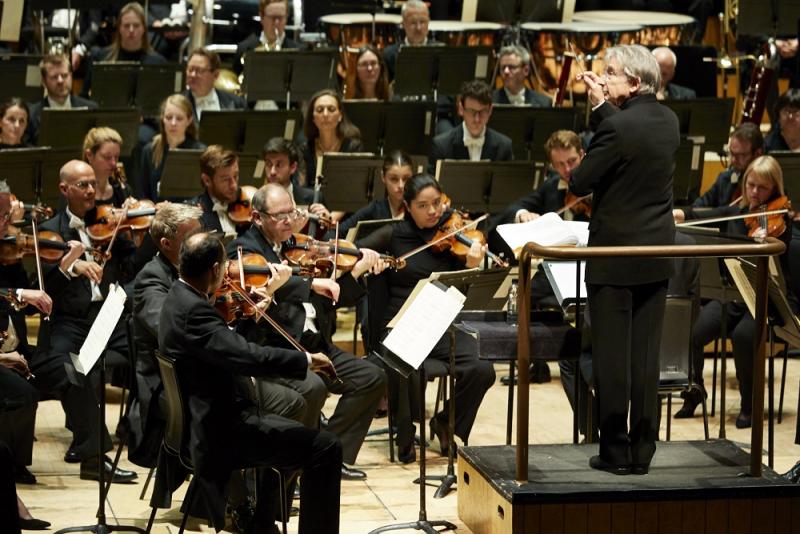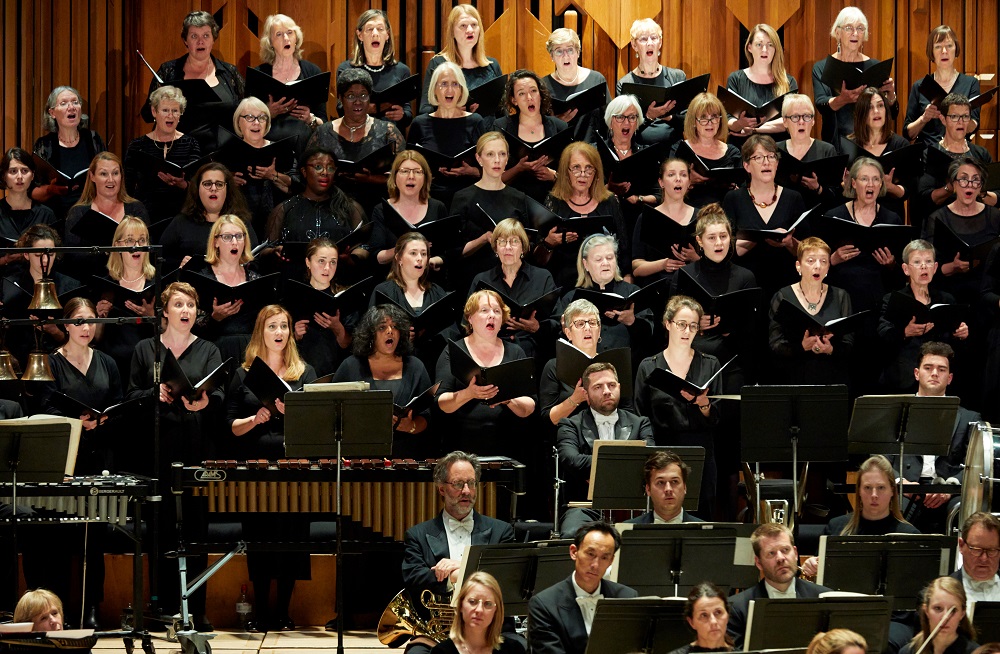Roméo et Juliette, LSO, Tilson Thomas, Barbican review - surprisingly sober take on Berlioz epic | reviews, news & interviews
Roméo et Juliette, LSO, Tilson Thomas, Barbican review - surprisingly sober take on Berlioz epic
Roméo et Juliette, LSO, Tilson Thomas, Barbican review - surprisingly sober take on Berlioz epic
'MTT' celebrates his 50th anniversary with a top orchestra, but the panache has gone

So much was fresh and exciting about Michael Tilson Thomas's years as the London Symphony Orchestra's Principal Conductor (1988-1995; I don't go as far back as his debut, the 50th anniversary of which is celebrated this season).
It came as a surprise to discover that Tilson Thomas, at least these days, doesn't encourage his orchestra to vocalise every phrase in what is, after all, an opera for orchestra. The opening tumult didn't quite bring the warring Montagues and Capulets to life; after the most perfect of oboe solos for dreamy Romeo from Olivier Stankiewicz, lights never fully blazed at the Capulet ball, not helped by a shaky launch, Tilson Thomas doing some uncharacteristic stamping at the door and frightening the orchestral horses. He is still master of the long romantic phrase; the odd proportions of the big central love scene made sense when passion was followed by a new depth in the more measured but even tenderer conversations which mark a long dying fall.
Mab, Queen of Dreams, can hardly fail to scintillate with players of this calibre - is not this hugely influential fantasy-scherzo the high watermark of refined orchestration? - but still needed to fly higher and lighter. The coda to the mesmerising funeral cortege for Juliet joined the end of the Balcony Scene in stilling and drawing an audience in, but both reminded us of what we should have been getting throughout. Memories of John Eliot Gardiner's supremely vivid Proms Berlioz are still too strong, and many LSO players will still have Colin Davis's Berlioz engraved on their hearts. Vocal honours went from excellent to good: Alice Coote wove the right timbral magic for the slightly tangential "Strophes"; Nicholas Phan, while not the ideal high, light French tenor necessary for the Mab "preview", got around the rapid phrases elegantly; and Nicolas Courjal, reliable if a little too self-pitying in the only dramatised role, that of Friar Laurence, didn't provide the wow factor of a real bass we badly need in Berlioz's oddly extended final scene of reconciliation (disproportionate to Shakespeare, welcome on Armistice Sunday).
Vocal honours went from excellent to good: Alice Coote wove the right timbral magic for the slightly tangential "Strophes"; Nicholas Phan, while not the ideal high, light French tenor necessary for the Mab "preview", got around the rapid phrases elegantly; and Nicolas Courjal, reliable if a little too self-pitying in the only dramatised role, that of Friar Laurence, didn't provide the wow factor of a real bass we badly need in Berlioz's oddly extended final scene of reconciliation (disproportionate to Shakespeare, welcome on Armistice Sunday).
The full London Symphony Chorus (women pictured above in a concert with Tilson Thomas earlier this year) came into its own here, but it would have been wiser to engage the small ensemble of students from next door's Guildhall School, narrators of things to come, as the warm-up act to the love scene, partygoers stumbling home from the ball. The whole delivered a good impression of this kaleidoscopic masterpiece; it's just that example has led us to expect the exceptional.
rating
Share this article
Add comment
The future of Arts Journalism
You can stop theartsdesk.com closing!
We urgently need financing to survive. Our fundraising drive has thus far raised £49,000 but we need to reach £100,000 or we will be forced to close. Please contribute here: https://gofund.me/c3f6033d
And if you can forward this information to anyone who might assist, we’d be grateful.

Subscribe to theartsdesk.com
Thank you for continuing to read our work on theartsdesk.com. For unlimited access to every article in its entirety, including our archive of more than 15,000 pieces, we're asking for £5 per month or £40 per year. We feel it's a very good deal, and hope you do too.
To take a subscription now simply click here.
And if you're looking for that extra gift for a friend or family member, why not treat them to a theartsdesk.com gift subscription?
more Classical music
 From Historical to Hip-Hop, Classically Black Music Festival, Kings Place review - a cluster of impressive stars for the future
From quasi-Mozartian elegance to the gritty humour of a kitchen inspection
From Historical to Hip-Hop, Classically Black Music Festival, Kings Place review - a cluster of impressive stars for the future
From quasi-Mozartian elegance to the gritty humour of a kitchen inspection
 Shibe, LSO, Adès, Barbican review - gaudy and glorious new music alongside serene Sibelius
Adès’s passion makes persuasive case for the music he loves, both new and old
Shibe, LSO, Adès, Barbican review - gaudy and glorious new music alongside serene Sibelius
Adès’s passion makes persuasive case for the music he loves, both new and old
 Anja Mittermüller, Richard Fu, Wigmore Hall review - a glorious hall debut
The Austrian mezzo shines - at the age of 22
Anja Mittermüller, Richard Fu, Wigmore Hall review - a glorious hall debut
The Austrian mezzo shines - at the age of 22
 First Person: clarinettist Oliver Pashley on the new horizons of The Hermes Experiment's latest album
Compositions by members of this unusual quartet feature for the first time
First Person: clarinettist Oliver Pashley on the new horizons of The Hermes Experiment's latest album
Compositions by members of this unusual quartet feature for the first time
 Gesualdo Passione, Les Arts Florissants, Amala Dior Company, Barbican review - inspired collaboration excavates the music's humanity
At times it was like watching an anarchic religious procession
Gesualdo Passione, Les Arts Florissants, Amala Dior Company, Barbican review - inspired collaboration excavates the music's humanity
At times it was like watching an anarchic religious procession
 Classical CDs: Camels, concrete and cabaret
An influential American composer's 90th birthday box, plus British piano concertos and a father-and-son duo
Classical CDs: Camels, concrete and cabaret
An influential American composer's 90th birthday box, plus British piano concertos and a father-and-son duo
 Cockerham, Manchester Camerata, Sheen, Martin Harris Centre, Manchester review - re-enacting the dawn of modernism
Two UK premieres added to three miniatures from a seminal event of January 1914
Cockerham, Manchester Camerata, Sheen, Martin Harris Centre, Manchester review - re-enacting the dawn of modernism
Two UK premieres added to three miniatures from a seminal event of January 1914
 Kempf, Brno Philharmonic, Davies, Bridgewater Hall, Manchester review - European tradition meets American jazz
Bouncing Czechs enjoy their Gershwin and Brubeck alongside Janáček and Dvořák
Kempf, Brno Philharmonic, Davies, Bridgewater Hall, Manchester review - European tradition meets American jazz
Bouncing Czechs enjoy their Gershwin and Brubeck alongside Janáček and Dvořák
 Solomon, OAE, Butt, QEH review - daft Biblical whitewashing with great choruses
Even a top soprano and mezzo can’t make this Handel paean wholly convincing
Solomon, OAE, Butt, QEH review - daft Biblical whitewashing with great choruses
Even a top soprano and mezzo can’t make this Handel paean wholly convincing
 Two-Piano Gala, Kings Place review - shining constellations
London Piano Festival curators and illustrious friends entertain and enlighten
Two-Piano Gala, Kings Place review - shining constellations
London Piano Festival curators and illustrious friends entertain and enlighten
 Echo Vocal Ensemble, Latto, Union Chapel review - eclectic choral programme garlanded with dance
Beautiful singing at the heart of an imaginative and stylistically varied concert
Echo Vocal Ensemble, Latto, Union Chapel review - eclectic choral programme garlanded with dance
Beautiful singing at the heart of an imaginative and stylistically varied concert
 Scott, Irish Baroque Orchestra, Whelan, RIAM, Dublin review - towards a Mozart masterpiece
Characteristic joy and enlightenment from this team, but a valveless horn brings problems
Scott, Irish Baroque Orchestra, Whelan, RIAM, Dublin review - towards a Mozart masterpiece
Characteristic joy and enlightenment from this team, but a valveless horn brings problems

Comments
As always, an insightful and
I agree. I too was present at